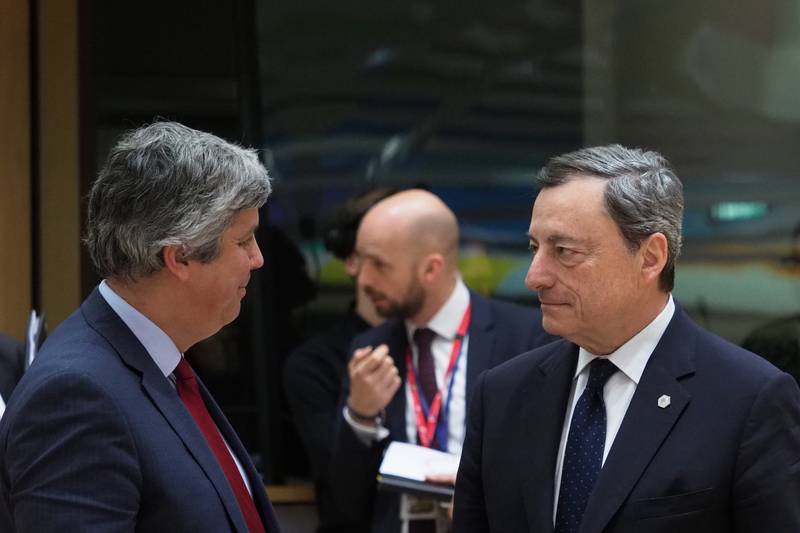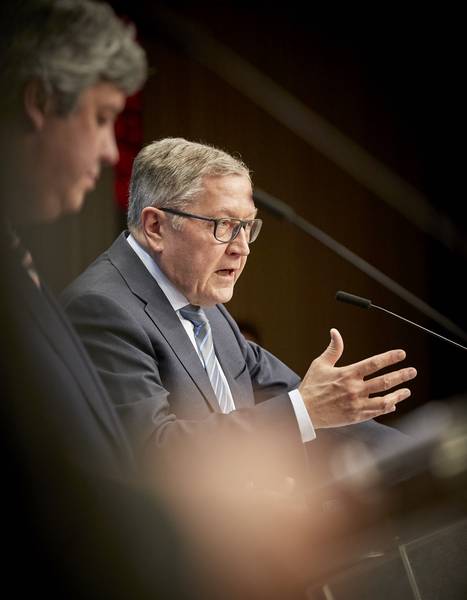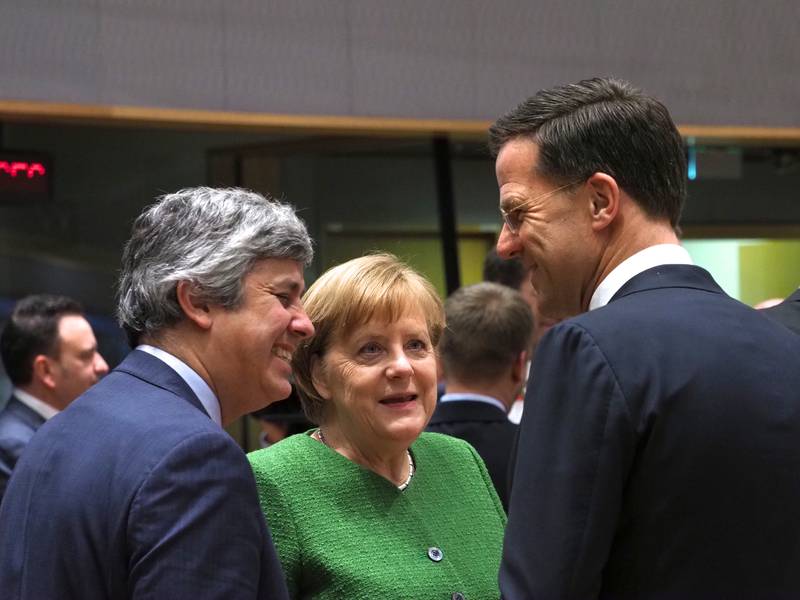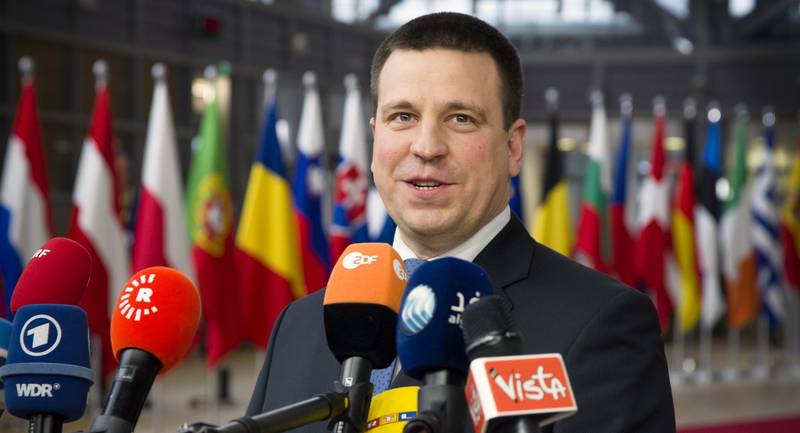Isn't It Time to Admit that the Window of Opportunity for a Eurozone Reform Is Closed?
Adelina Marini, April 11, 2018
 In less than a year, the plans for a reform of the euro area went through several physical conditions. After Emmanuel Macron's election as president of France in the end of last spring, preparations started bubbling up for an almost quantum leap in the deepening of euro area integration. Integrationists from all corners of the European Union started gathering with the big scissors around the tailor's table and began drawing. In the summer, it seemed as if this time the Union will abandon its policy of the small step and will jump way forward. But because of the prolonged formation of a government in Berlin, enthusiasm began cooling down and ambition to evaporate.
In less than a year, the plans for a reform of the euro area went through several physical conditions. After Emmanuel Macron's election as president of France in the end of last spring, preparations started bubbling up for an almost quantum leap in the deepening of euro area integration. Integrationists from all corners of the European Union started gathering with the big scissors around the tailor's table and began drawing. In the summer, it seemed as if this time the Union will abandon its policy of the small step and will jump way forward. But because of the prolonged formation of a government in Berlin, enthusiasm began cooling down and ambition to evaporate.
The ink still wet on the list of names of German ministers and a new cold wave came from Italy, where the winners from the March 4 elections are mostly eurosceptic parties, one way or another. The handbrake, however, has been pulled by six, mainly small, EU member states - Denmark, Estonia, Finland, Ireland, Latvia, Lithuania, The Netherlands and Sweden - who demanded reformist passions to cool down and continue with the small and cautious steps.
There's only "R" left of the reform
The meeting of euro area ministers on 12 March showed clearly that the so called window of opportunity is now closed. Only two cosmetic reforms managed to slip through - completing the second pillar of the banking union through establishing a financial backstop for the Single Resolution Fund (SRF), and transforming the permanent euro area rescue fund - the European Stability Mechanism (ESM) - into a European Monetary Fund. This is the sanitary minimum of the reform, whose full volume in the period of boiling of reformist passions included completing the entire banking union, which means also creating a European Deposit Insurance Scheme (EDIS); establishing a European Monetary Fund but under EU legislation; creating a fiscal capacity for the euro area; a minister of economy and finance; transferring the fiscal compact under EU legislation.
The March Eurogroup made it clear that currently the only feasible reforms are of the ESM in its current institutional framework, which is an intergovernmental agreement. The ESM wills serve as a financial backstop of the SRF. There is also an agreement the ESM to turn into an EMF. The devil, however, is always in the details. In the words of Eurogroup chief Mario Centeno (Portugal, independent), by June - the deadline for agreeing on a euro area reform - it will be needed to work more on all elements of the ESM reform. He emphasised that in June a comprehensive package will be presented, not just separate initiatives.
The completion of the banking union is stuck. Among the ministers prevails the opinion that it is better to stick to the road map of June 2016 and not to discuss any new measures. This means completing only the second pillar of the banking union - the mechanism for resolution of troubled banks. The last brick of it was finding a financial backstop for the resolution fund, which will take over in case the fund has not yet reached its full financial capacity. There is an agreement the role of a financial backstop to be played by the ESM. But for the banking union to be completed it is necessary to build the third pillar, which is EDIS.
The scheme has been for years the apple of discord between the south and the north in the euro area. In January, it seemed that there is a chance this problem to be resolved as well but the March Eurogroup showed that the chance is gone - division between countries who want risks in the banking systems to be cleared first before moving toward risk-sharing and those who prefer these two things to  go in parallel is insurmountable. The lack of progress on this essential part of the completion of the banking union forced the ESM chief, Klaus Regling, to make a strong appeal in defence of the scheme.
go in parallel is insurmountable. The lack of progress on this essential part of the completion of the banking union forced the ESM chief, Klaus Regling, to make a strong appeal in defence of the scheme.
"But I want to mention one point because I realise there is scepticism in a number of countries with regard to EDIS, and I want to make the point that is often forgotten: that if we had had a common, credible deposit insurance scheme in the last few years, all our ESM and EFSF programmes would have been smaller". Klaus Regling explained that, on average, 40% of bailout money was spent on banking systems. "So, I think that’s one important reason why EDIS indeed is in the interest of the euro area as a whole", the chief of the euro area bailout fund added.
In defence of the common scheme spoke also IMF chief Christine Lagarde, whose name has circled as a possible candidate for successor of Jean-Claude Juncker (Luxembourg, EPP) as European Commission president. In a speech in end-March, in Germany, she said that EDIS will allow the costs of a bank failure to be shared in the entire euro area. "It would reduce the risk of banking sector problems being shouldered by taxpayers and turning into another sovereign debt crisis", Ms Lagarde explained. According to her, in exchange, banks with high levels of non-performing loans could commit to more aggressively clean their balance-sheets. Banks could also pile up more capital to ensure possibilities to absorb future losses.
But the Nordic wing of the EU remained relentless. The finance ministers of Denmark, Estonia, Finland, Ireland, Latvia, Lithuania, The Netherlands and Sweden wrote a letter to their colleagues in which they state their common positions on all the major points of the euro area reform. They are determined that talks on EDIS can only start if "sufficient progress" is achieved on risk-reduction measures. It is not clear, however, what exactly "sufficient" means.
Now is not the time for a fiscal capacity
Despite strong resistance, Mario Centeno, nevertheless, decided to propose one of the big ideas for upgrading the euro area to discussion, namely the establishment of a central fiscal capacity. This is in fact the beginning of a euro area budget. EU economic and financial affairs Commissioner Pierre Moscovici (France, S&D) insisted a lot on discussing everything that is on the table, despite scepticism. "Our work has been focusing until now on two key areas, identified in December by leaders as those in which discussions are most ripe and these are the reform of the ESM, its role in possible future programmes and its future governance, and the completion of the banking union, and specifically the establishment of a common backstop. These are, of course, part of the package of proposals that the Commission has put forward in December. But moving forward with these areas, first, if indeed that is the case, should not mean that we lose sight of the other aspects of the package which forms a coherent whole", he urged in the end of the March Eurogroup.
After the discussions however, Mario Centeno announced that the idea of a fiscal capacity for the euro area is a "long-term issue", which means that it will not be part of the June package and will continue to be discussed after the June summit. His words reveal that there are still a lot of uncleared issues related to the concept of the capacity. "We will notably need to discuss further what objectives should be addressed by a central fiscal capacity and what different forms it could take. Some of us also emphasised that discussions on a fiscal capacity should also take into account fiscal rules", Mr Centeno said, obviously having in mind the six finance minsters' letter in which they do not explicitly mention the  fiscal capacity but underline that it is important efforts to focus on actions on national level and to ensure full respect of common rules.
fiscal capacity but underline that it is important efforts to focus on actions on national level and to ensure full respect of common rules.
"It starts with implementing structural reforms and respecting the Stability and Growth Pact, thereby building up fiscal buffers in national budgets to allow room for national fiscal policies, both automatic and possibly discretionary stabilisation, in order to smoothen economic downturns. This would ensure a robust EMU with better stabilisation, resilience and sound structures as well as improved convergence", the letter of the six says.
The issue was on the agenda of the quite vague euro area summit, which was part of the spring European Council on 22-23 March. The words of European Council President Donald Tusk (Poland, EPP), however, made it clear that there was no enthusiasm. "Many of the themes we discussed – like a fiscal capacity for the euro area – are controversial, but I see avenues to be explored", he said after the summit which ended without conclusions. This is a clear sign that the euro area reform has reached the freezing point.
Christine Lagarde dedicated a significant part of her speech in Germany on the fiscal capacity. According to her, the euro area needs a central fiscal capacity to avoid the experience with the crisis. This instrument will reassure investors that the euro area has better tools to prevent the spreading of the next crisis. A capacity can smooth the economic cycle and improve the functioning of the currency inion. The IMF published a detailed paper this spring on the instrument, in which it points out that a fiscal capacity could reduce the negative effects of a crisis with more than 50%.
The IMF has two proposals to overcome the differences around EDIS. The first is to ensure that all countries will meet their commitments by making transfers from the capacity conditional on respecting fiscal rules. The other proposal is countries to pay premiums in good times based on the benefits they will have from the capacity in bad times. Something like raising the price of insurance after a car accident. This will help avoid the problem with permanent transfers which is a nightmare for the Nordic part of the euro area.
Deflated enthusiasm for a euro area reform could be felt the strongest with the Mercron duo after the euro area summit on 23 March. Around New Year, it was expected the German chancellor and the French president to come up in March with a joint proposal on euro area future but the formation of a government in Berlin spoilt those plans. Emmanuel Macron announced that a series of talks with Germany in the coming weeks with the objective being the two sides to come up with a joint roadmap in June. In the meantime, however, the vacuum left by the prolonged coalition talks in Germany, was filled by the six countries which are working very actively together. This means that France and Germany are no longer the only motor of Europe.
Dutch Prime Minister Mark Rutte was in this regard painfully open during his visit in Germany in March. In an interview for Der Spiegel, he said that when Germany, France and the European Commission are in agreement the other member states should be extremely careful. He believes that to prepare for the next crisis, first, Europe has to find an answer to the question how to create incentives for countries like France, and particularly Italy, to implement structural reforms. "To do this, we don't need a European finance minister", Mr Rutte said and reiterated that a priority number one is removing hurdles in the single market.
"What Europe is missing is not billions more in funding, but rather overdue structural reforms -- including in the service industry. There are currently nearly 5,000 protected professions in the EU and in Germany. This hinders growth, as any economist will tell you", the Dutch PM said. The Irish Prime Minster Leo Varadkar shares the same view. He again emphasised that the best way to reinforce the euro area is national policies - countries to balance their budgets, to reduce their debts, to improve their  competitiveness. "And that's the most effective thing. It should not be substituted by European action", he said in the end of the spring European Council.
competitiveness. "And that's the most effective thing. It should not be substituted by European action", he said in the end of the spring European Council.
Estonia's Prime Minister Juri Ratas made a special statement before the spring summit about the benefits of the single market. "25 years ago the single market was created. It has boosted our growth and also created the jobs. It is so necessary and good for our economy. But today we are falling behind in the digital market. We need to catch up", he said.
In June, it will be clear what exactly will remain of the big reformist efforts. Judging by Donald Tusk's words that the most urgent political priority now is reinforcing the banking union (not completion) and the development of the ESM we should not nourish big expectations for the package in June. It seems the time has come to admit that the window of opportunity is closed. The most important conclusion from the deflation of the reform bubble is that the change of balance in Europe is a fact. It managed to prevent a multi-speed Europe. Insisting to include non-euro countries in all the plans for the future of the euro area prevented the separation of a high-speed euro area from the EU. While this can be a good news for the EU, it might not be a good one for the euro area.
 Angela Merkel, Emmanuel Macron | © Council of the EU
Angela Merkel, Emmanuel Macron | © Council of the EU Benoit Coeure | © Council of the EU
Benoit Coeure | © Council of the EU Pierre Moscovici | © Council of the EU
Pierre Moscovici | © Council of the EU